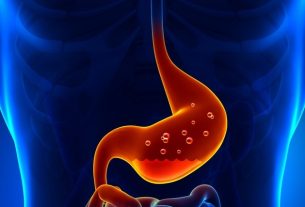Some teas, such as peppermint, mallow or melon seeds, can help relieve stomach pain or a burning sensation in the pit of your stomach because they have calming properties that act on the digestive system.
Stomach pain can be caused by gastritis, gastroesophageal reflux, the presence of stomach ulcers or gastroenteritis, for example, or even anxiety and can be accompanied by other symptoms such as nausea or vomiting. Better understand the causes of stomach pain.
Although they cannot replace medical treatment, teas are a good option to help control stomach pain, and can be used to complement the treatment recommended by your doctor.
Some tea options for stomach pain are:
1. Peppermint tea
Peppermint tea, with its scientific name Mentha piperita L., is rich in volatile oils such as menthol and menthone, which have anti-inflammatory, antispasmodic, calming and analgesic properties, which help to relieve stomach pain, and reduce other symptoms of gastrointestinal problems, such as nausea or vomiting.
Ingredients
- 6 chopped peppermint leaves;
- 150 mL of boiling water.
Preparation mode
In a cup, add the water over the chopped peppermint leaves, cover and let it rest for 5 to 7 minutes. Strain, sweeten with honey if desired, and drink 3 to 4 cups a day, right after meals.
2. Boldo tea
Boldo tea, prepared with dried Chilean boldo leaves or fresh Brazilian boldo leaves, is rich in boldine and rosmarinic acid, substances with digestive, anti-inflammatory, antispasmodic and astringent properties, which help reduce gastric acidity, protecting the stomach and relieving the pain.
Due to these properties, boldo tea is often used to help treat heartburn and poor digestion.
Ingredients
- 1 teaspoon of chopped boldo leaves;
- 150 ml of water.
Preparation mode
Add the chopped boldo leaves to 150 mL of boiling water. Let it rest for 5 to 10 minutes, strain and drink warm immediately, 2 to 3 times a day, before or after meals. Another option is to drink a cup before bed to help digestion after dinner.
Boldo tea can cause side effects, especially when consumed in excessive quantities and for more than 20 days, in addition to being contraindicated for pregnant women and people with acute hepatitis, gallstones, inflammation of the bile ducts or pancreatitis.
3. Fennel tea
Fennel tea has anethole, ursole and camphor in its composition, with antispasmodic, anti-inflammatory, analgesic and digestive action, which help to relieve stomach inflammation, reducing the burning sensation in the throat. Furthermore, it also helps empty the stomach, which makes it an excellent natural option for relieving stomach pain and reducing heartburn attacks.
Ingredients
- 1 tablespoon of fennel seeds;
- 1 cup of boiling water.
Preparation mode
Add the fennel seeds to the cup of boiling water. Cover and let it cool for 10 to 15 minutes. Strain and then drink 2 to 3 cups a day, 20 minutes before a meal. Another option for preparing this tea is to use a fennel tea bag. Find out other ways to use fennel.
Fennel tea should not be used by pregnant or breastfeeding women.
4. Alteia tea
Alteia tea, also known as malva-branca or malvaísco, must be prepared using the root of the medicinal plant. Althaea officinalis. This plant has anti-inflammatory, softening, calming and stomach-protective effects, which helps to relieve pain or burning in the stomach.
Ingredients
- 1 tablespoon of marshmallow root;
- 1 cup of boiling water.
Preparation mode
Add the marshmallow root to the cup of boiling water and let it rest for 10 minutes. Strain and then drink up to 2 cups per day.
5. Ginger tea
Ginger tea contains gingerol, chogaol and zingerone, which are substances with anti-inflammatory and antiemetic properties, which help to relieve inflammation of the esophagus and reduce stomach acidity, reducing pain and the burning sensation in the stomach.
Furthermore, ginger tea has an antiemetic action, which helps relieve nausea and vomiting that can be caused by stomach pain. Discover other benefits of ginger.
Ingredients
- 1 cm of ginger root, cut into slices or grated;
- 1 liter of boiling water.
Preparation mode
Bring the water to a boil and add the ginger. Let it boil for 5 to 10 minutes. Remove the ginger from the cup and drink the tea in 3 to 4 divided doses throughout the day, 20 minutes before a meal.
Another option for making tea is to replace the root with 1 teaspoon of powdered ginger.
This tea should be avoided by people with active stomach bleeding, due to an ulcer, for example, or by people who are using anticoagulant medications, as ginger has anticoagulant properties that can cause or increase the risk of bleeding and hemorrhage.
What to eat for stomach pain
Pain and burning in the stomach can be caused by stress and poor diet, among other causes. Discovering its cause is essential for treating the disease, as well as avoiding the consumption of sugars, fats and foods such as oranges, lemons, strawberries, açaí, fast food, tomatoes and onions.




